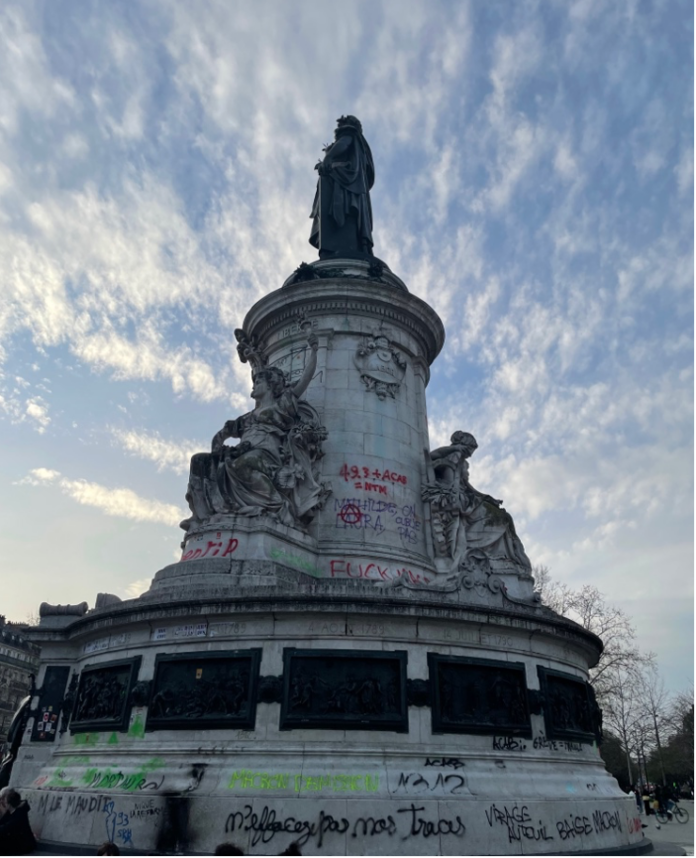By Hana Kolar
The political uproar of France in the first half of 2023 was at the face of the media, with articles and new outlets covering the anger of citizens. From the 19th of January 2023, protests began all throughout France, revolting against the Government’s pension reform project to raise the retirement age from 62 to 64 years.
In the nation’s capital, the vocalisation of frustration was often heard, especially of those living in the heart of Paris as the strikes and protests ensued, causing blockages, increased cases of police presence and violence. However, both French nationals and foreigners were often seen participating in these protests, supporting the common goal to have their opinions regarding by the government.
Students were also seen to be actively involved in the protests. Pupils at Sciences Po Paris, a research university of social sciences, were seen protesting on multiple occasions. Through barricading the entryway to the Saint Guillaume campus on the 8th of March 2023, this, alongside other similar occurrences, resulted in some classes being cancelled or moved to an online platform. This consequentially caused disruptions for both students and teachers, affecting the university curricular.
As the protests continued across France, from the 6th of March onwards, Paris was seen littered with rubbish for a three-week period, as media coverage focused on trash collectors of the capital joining the protest against the government and limiting access to waste incinerators.
Just as things were suspected to have settled down, news had surfaced that the reform to the pension would ensue, moments before parliamentary vote was set to occur. Invoking article 49:3 of the French Constitution, the Government was enabled to pass a law without a vote, unless the parliament chose to pass a ‘noconfidence’ motion.

Protests have since continued to occur, progressively getting more violent as the balance between the freedom of speech and the danger of uncontrolled protesting was increasingly strained.
One student of Sciences Po Paris recounted her experience being tear gassed alongside her friends at a night-time protest, explaining how she carried a keychain (see pictured to the left) containing phone numbers of her family and friends, as well as her forearm being marked by the same numbers in case of an emergency.
The response of the public to the actions of the Government reflected similarities to the Yellow Vest Movement (Gilets Jaunes) which took place in November of 2018 in response to the rise of tax on diesel and petrol. Similarly to the current protests occurring, what started as a protest against tax soon transformed into a wider protest against the actions of the French Government. Citizens argued that President Macron was favouring the elite, privileged class of the population as tax increase and low wages impacted more severely low- to middle-income families, particularly single mothers, on their ability to support themselves and their children.
Both protests highlight the ingrained cultural system where what is rooted in the population is a desire to be heard. Throughout history, the French Republic has demonstrated a desire for their leaders to reflect and uphold of values of the nation. The cyclic nature of protesting the Government has led, to some degree, to positive change for the French in the past. It can equally allow us to wonder what the outcome of this current wave of protests will be.
So how may these protests affect France’s diplomatic, economic and trade relations? The strain between the government and its people have been present since the beginning of January, even more so with the news of Nahel Merzouk’s death, police brutality concerns and tensions are increasing. President Macron was seen to have left the European summit in Brussels (29–30 June 2023) early and has postponed his upcoming planned visit to Germany – a visit intended to demonstrate the strength of France’s friendship with Germany, despite each country’s ongoing economic, defence and energy issues.
With increasing societal issues being faced by France such as discrimination, police brutality, integration, crime rates in immigrant-prominent suburbs, social inequality, and tensions between civilians and the military, the French President has been seen in crisis cabinet meetings to direct ministers. As the protests have begun in French overseas territories, such as French Guiana, Martinique, Guadeloupe, and Reunion, it is still unclear as to what the potential long-term impacts on France’s diplomatic, economic and trade relations will be due to the current protests occurring.
This could arguably echo a greater sense of dissatisfaction of governmental actions, demonstrating this issue sensitivity goes beyond strictly continental French boarders. Only the future will demonstrate whether both the French citizens as well as President Macron’s methods will induce grounds for stability, or further chaos.
About the author:
Hana Kolar is a 4th year law(honours)/science student at Monash University, Australia. She has just completed a law school exchange at Sciences Po Paris last semester and continues to explore her interests in global legal and political spheres. She is a Junior Legal Officer to the International Institute IFIMES.





